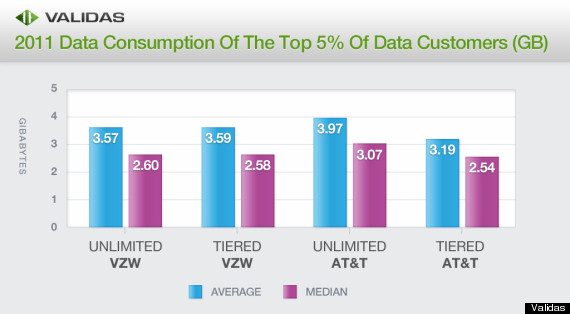
AT&T joined Verizon last year in throttling the top five percent of subscribers to its unlimited plans, slowing down the data speeds of heavy users as a punishment for taking up too much of the network and to ensure that its network remains fast and available for all its users.
The move led to an outcry from the throttled, with many complaining that the ultra-slow throttled speeds rendered their expensive smartphones and unlimited data plans useless; in an AP report, one throttled AT&T customer claimed that a webpage that would usually load in one second to load now took two minutes to appear on his smartphone.
Now, a new study has emerged that is sure to make those users even madder: In addition to being occasionally Draconian, the study finds that throttling is pointless and ineffective. The top users on unlimited plans are using just about the same amount of data as the top users on tiered plans -- but only users of unlimited plans are the victims of throttling.
Validas, a mobile analytics firm founded by two former Verizon execs, looked at over 55,000 phone bills from the top five percent of data users on both unlimited and tiered data plans on AT&T and Verizon; the company found that the top users on both unlimited plans and tiered data plans were going through roughly the same amount of data per month.
Here are the findings, which show that the top five percent of users on unlimited and tiered plans aren't so different in the amount of data they're consuming:

When we look at the Top 5% of data users, there is virtually no difference in data consumption between those on unlimited and those on tiered plans—and yet the unlimited consumers are the ones at risk of getting their service turned off. So it’s curious that anyone would think the throttling here represents a serious effort at alleviating network bandwidth issues. After all, Sprint gets by fine maintaining non-throttled unlimited data to its customers.
The Validas study is titled with a provocation: "Why Throttle “Unlimited” Data Plans: Save Bandwidth or Drive Conversions to Tiered Data?" Upset customers at AT&T and Verizon have accused the two carriers of throttling in order to force unlimited users to switch over tiered data plans, which customers say limit the utility of their phones and come with the potential for expensive overage charges.
Both AT&T and Verizon stopped offering unlimited data plans to new subscribers in 2011 but allowed customers who were already paying for unlimited plans to keep theirs. Both companies have consistently argued that they are only throttling when absolutely essential in heavily congested neighborhoods, and have defended throttling as necessary to keep their networks speedy for all customers; T-Mobile also throttles its users, though it is very clear about when it does so: After the user breaches 5GB of data in a month, the throttling begins.
Where Verizon and especially AT&T have run into trouble is on the seemingly arbitrary nature of who gets throttled, as detailed thoroughly by Peter Svensson of the Associated Press. This study from Validas is sure to only further incite the outrage of the throttled, who have seen the speeds of their unlimited plans choked, perhaps without cause.